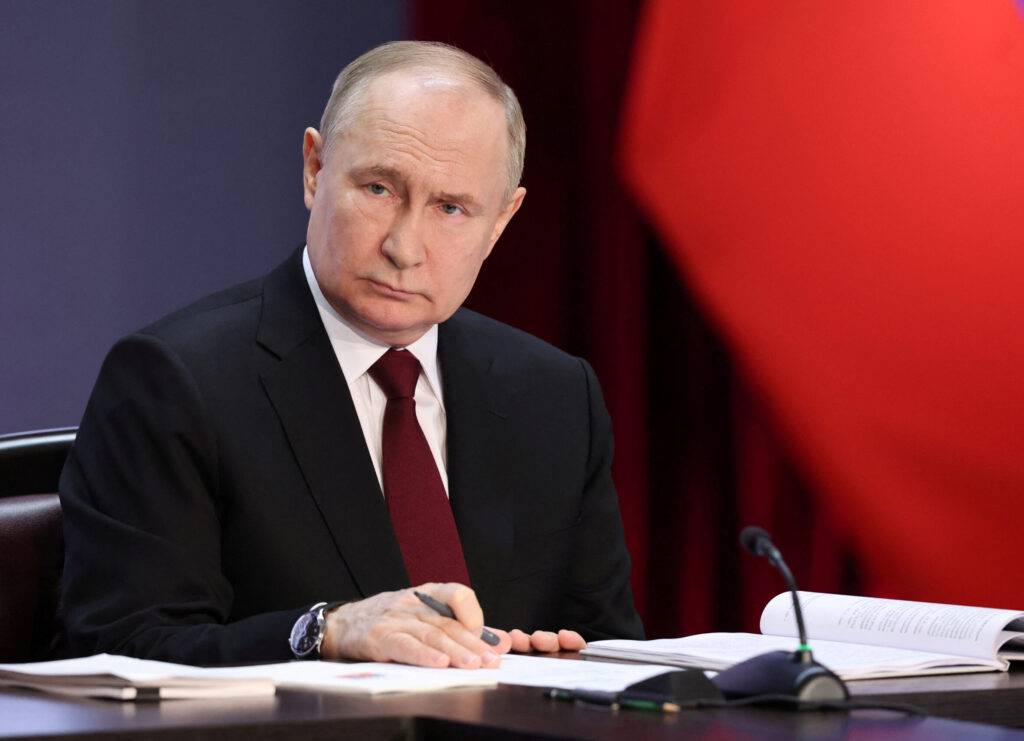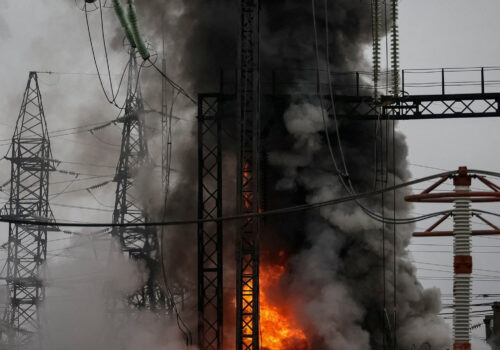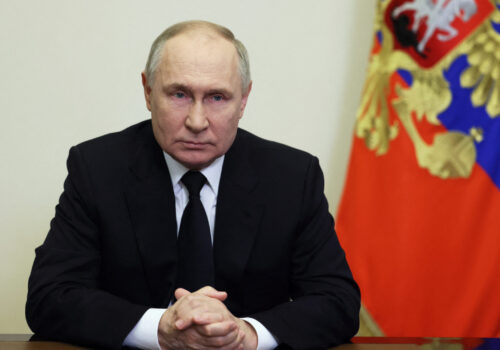Corruption has long been a favorite weapon in Vladimir Putin’s arsenal. He used it extensively against Ukraine over a number of years to help prepare the ground for the full-scale invasion of February 2022. The Russian leader now appears to be employing the same weaponized corruption tactics honed earlier in Ukraine to undermine Europe and weaken the continent’s democratic institutions from within.
Czech and Belgian law enforcement agencies reported in late March 2024 that Kremlin-linked Ukrainian oligarch Viktor Medvedchuk was behind a Prague-based Russian propaganda network centered around the Voice of Europe outlet. Medvedchuk is accused of masterminding the distribution of anti-Ukrainian narratives in the European media and paying European Parliament members to promote Russian interests in their legislative activities.
This latest corruption scandal is a painful reminder that the EU and US remain at significant risk of Russian electoral interference in the lead-up to elections later this year. For the EU specifically, the scandal further demonstrates that it must put its own house in order if it is to credibly demand Ukraine do the same during the latter’s ongoing EU accession negotiations.
Stay updated
As the world watches the Russian invasion of Ukraine unfold, UkraineAlert delivers the best Atlantic Council expert insight and analysis on Ukraine twice a week directly to your inbox.
The oligarch at the center of the scandal, Viktor Medvedchuk, has close ties to Russian President Vladimir Putin, who is godfather to Medvedchuk’s daughter. Throughout the three decades following Ukrainian independence in 1991, Medvedchuk was a prominent figure in the country’s political life and a vocal advocate of Russian interests.
Medvedchuk’s personal relationship with Putin helped earn him a reputation as the Kremlin’s unofficial representative in Ukraine. This led US intelligence agencies to identify Medvedchuk as one of Moscow’s top choices to head a puppet Ukrainian administration in the event of a successful invasion.
When Russian troops crossed the border in February 2022, Medvedchuk initially went into hiding. However, he was detained by the Ukrainian authorities two months later, and was eventually traded for a large number of Ukrainian POWs in one of the most controversial prisoner exchanges of the war.
Regardless of his exile and loss of Ukrainian citizenship, Medvedchuk remains an important ally to Putin. His leadership of the Voice of Europe influence operation indicates Europe’s continued vulnerability to the Kremlin’s weaponized corruption. Whereas Ukraine, the US, UK, Canada, Australia, and New Zealand all imposed sanctions on Medvedchuk and his associates some time ago, the European Union did not do so. As a result, Medvedchuk was still able to do business in Europe.
As a result of this apparent oversight, several of Medvedchuk’s EU-based assets are thought to have remained untouched until his involvement with Voice of Europe was uncovered. This gave him a degree of maneuverability with his EU-based financial assets that appears to have facilitated his allegedly illicit activities.
Eurasia Center events

In the wake of the recent revelations, the Czech authorities have imposed sanctions on Medvedchuk and other Kremlin-linked associates. Meanwhile, Belgian law enforcement agencies have opened probes into alleged bribes paid to serving MEPs from France, Germany, Belgium, the Netherlands, Poland, and Hungary, with the Polish authorities also launching an investigation.
While these measures are welcome, it is not clear why EU authorities did not act earlier to counter the Kremlin’s weaponized corruption. Many now fear the current scandal is just the tip of the iceberg in terms of Russian efforts to infiltrate democratic institutions and the media throughout the Western world. Looming elections on both sides of the Atlantic have added a sense of urgency to this debate.
In theory, the European Commission’s “freeze and seize” task force is meant to coordinate with the rest of the Russian Elites, Proxies, and Oligarchs (REPO) task force, which features the relevant national sanctions authorities from G7 member states and Australia. The fact that the EU’s sanctions listings still do not fully align with that of its REPO allies, especially on somebody as prominent as Medvedchuk, raises serious concerns over the effectiveness of this coordination.
The European Union should be setting an example when it comes to combating corruption. When recommending that the European Council open official EU accession negotiations with Ukraine in late November 2023, Commission Vice President Věra Jourová cautioned that Ukraine still had a long way to go in developing anti-corruption regulations, even as she praised the significant progress made by the Ukrainian authorities so far. Inevitably, questions are now being asked about the credibility of the EU’s own anti-corruption policies.
Recent claims of a major Russian influence operation operating in the heart of the EU should serve as a wake-up call for policymakers throughout the West. With the Kremlin clearly preparing for a long-term geopolitical confrontation, the need for vigilance will only grow. In response to this threat, transatlantic institutions should prioritize bolstering their ability to resist Russia’s weaponized corruption, while making sure the Kremlin’s agents are subject to the maximum available restrictions.
Francis Shin is a Research Assistant at the Atlantic Council’s Europe Center.
Further reading
The views expressed in UkraineAlert are solely those of the authors and do not necessarily reflect the views of the Atlantic Council, its staff, or its supporters.

The Eurasia Center’s mission is to enhance transatlantic cooperation in promoting stability, democratic values and prosperity in Eurasia, from Eastern Europe and Turkey in the West to the Caucasus, Russia and Central Asia in the East.
Follow us on social media
and support our work
Image: Russian President Vladimir Putin attends an extended meeting of the Interior Ministry board in Moscow. April 2, 2024. (Sputnik/Sergei Savostyanov/Kremlin via REUTERS)




